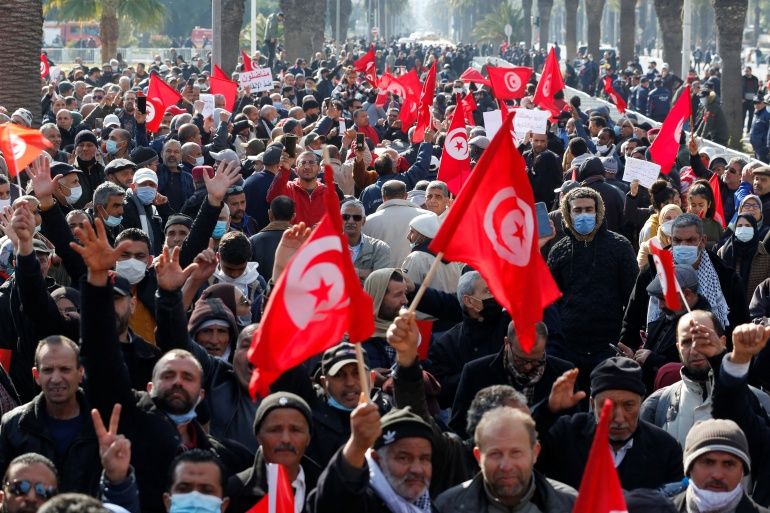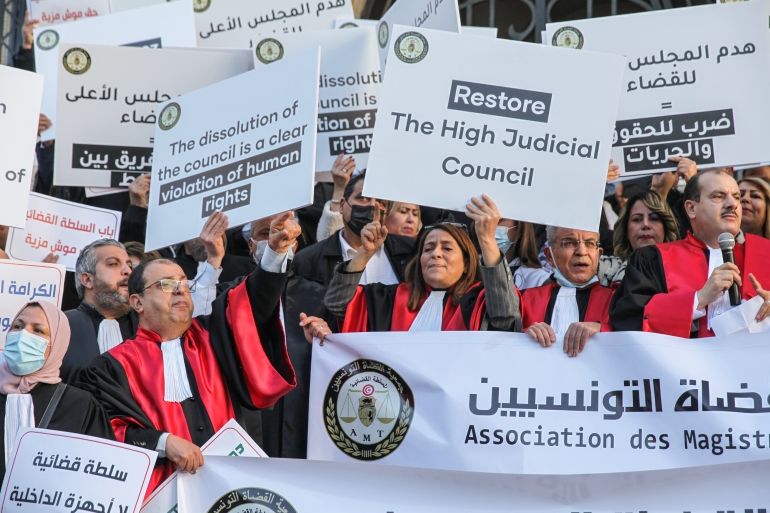
Saied accused of taking Tunisia back towards one-man rule
Political crisis in Tunisia has intensified following President Kais Saied’s decision to dissolve the parliament after freezing it in a power grab on July 25 last year.
The decree came on Wednesday just hours after the members of the last house held a plenary session online and voted to end his exceptional measures, which included the suspension of the chamber and the sacking of the prime minister, along with the seizure of legislative and judicial powers.
The president also promised that the legislators who had opposed presidential rulings in the virtual meeting would be prosecuted on heavy charges of “conspiring against state security”.
Tunisia’s justice minister launched a judicial investigation against more than half of the members of the now-dissolved parliament who took part in the online session.
As many as 121 out of 216 of them were summoned for questioning by an anti-terrorism unit on Friday. The mass investigation marked a major escalation in the president’s targeting of his opponents who have been openly defying his attempts to remake the political system in what they call a coup.
“Kais Saied planned well before last July to seize broad powers, sideline political parties, and change the system,” a democratic activist who chose to use a pseudonym, “Haythem”, told Al Jazeera. “He just suspended the parliament then not to make his intervention look like a coup”.
The centre-leftist partisan noted how the head of state has over time lost trust from the educated segments of Tunisian society and the major parties, while he continues to enjoy popular support.
‘Rule and legislate by decree’
Many Tunisians welcomed the actions undertaken by Saied, who deemed them necessary to save the country from a corrupt, self-serving elite he held responsible for years of political paralysis and economic stagnation.
To date, the president has not taken concrete steps to tackle needed reforms while he has made moves that have triggered accusations that he is taking the country back towards a one-man rule.
 Demonstrators chanted ‘shut down the coup… take your hands off the judiciary’
Demonstrators chanted ‘shut down the coup… take your hands off the judiciary’
“He’s progressively dismantling the institutions created since 2011, destroying all the counterpowers in the country,” Haythem argued. “Most MPs now believe he has no intent to restore democratic rule of law.”
Radwan Masmoudi, a member of the moderate Islamist Ennahdha party, observed that Saied did not dissolve the chamber back in July knowing he had no constitutional right to do that.
Wednesday’s parliamentary vote, he continued, offered the head of state a chance to step in, while being aware that it was still unconstitutional to order a dissolution, emboldened by a number of presidential decrees that he used to assume near-total power.
Masmoudi alluded specifically to Decree 117, issued last September, which suspended most of the country’s constitution, extended the freezing of the parliament, and granted the head of state the right to rule and legislate by decree.
“Right now, Tunisia is in no man’s territory. We are without a constitution and have a president who can do whatever he wants,” the Ennahdha member told Al Jazeera.
Sarah Ben Hamadi, an observer of the Tunisian political scene and Twitter influencer, thinks the president could have terminated the parliament in the wake of his July 25 “coup de force”, instead of eight months later, and initiated a democratic process to hold quick legislative elections.
“Saied has a very personal reading of the constitution, and is applying his own interpretation of the text,” she told Al Jazeera. “He’s also very unpredictable, so we can’t really anticipate his decisions, we don’t know what to expect.”
The dissolution of the assembly
Under Article 80 of Tunisia’s 2014 Constitution, Saied cannot dissolve the parliament during an exceptional period of the kind he announced last year.
Even Article 72, which the head of state invoked, does not allow him to do so. The dissolution of the assembly can only occur if the majority of deputies vote a motion of no-confidence in the government twice, and should prompt a new election within 90 days as stipulated by Article 89.
Despite dissolving the legislative assembly, Saied late on Thursday ruled out parliamentary elections within the next three months. Instead, he said, he will move to rewrite the constitution, which will be put to a referendum on July 25, before conducting elections on December 17 – in line with the political roadmap unveiled last December – while suggesting that opposition politicians may not be allowed to run in future polls.
“Legally, since it’s dissolved, parliament must remain in session until a new vote is held within the 90-day period,” Masmoudi, the Ennahdha member, maintained qualifying the president’s latest move as another breach of the constitution.
He also indicated the possibility that the upcoming constitutional referendum and legislative polls may be run under either the interior ministry or the defence ministry. It is unclear whether they will be organised by an independent body. Members of the Independent High Authority for Elections (ISIE) fear that Saied may dissolve the independent body and institute a provisional election commission to oversee the next elections.
Parties from across Tunisia’s political spectrum and the powerful UGTT labour union urged the head of the state to call early polls after the dissolution of parliament.
More political parties have been actively opposing Saied. Ennahdha, the biggest party in parliament and main opposition force, and the Free Constitutional Party, which leads in opinion polls, have said they will reject his plans for July’s referendum.
“The danger is Saied wants to push through his own constitution, under the cover of a national referendum, change the rules of the game, keep out his opponents, and see his planned elections through,” Haythem warned.
“We’re watching a one deaf man show. The only hope is to have snap elections,” he pointed out.
Intimidation and persecution against opposition figures
Without an elected, functioning parliament in place, and in the current climate of intimidation and persecution against the country’s main opposition figures, any national voting will happen outside the framework of rule of law, analysts say. Meaning it is unlikely that Tunisians will see free or fair elections under the present conditions, they say.
Monica Marks, a prominent expert on contemporary Tunisian politics, articulated in a tweet thread how the sequencing of elections is critical.
 Judges have protested against the dissolution of the top judicial watchdog
Judges have protested against the dissolution of the top judicial watchdog
“If Saied gets his referendum before legislative elections, it’s entirely possible new free and fair parliamentary elections won’t be held in Tunisia,” she posted. “Whereas if everyone determinedly rallies around the demand to hold new elections within 90 days, it’s possible that an exit ramp off Saied’s highway to consolidated dictatorship in Tunisia could materialise.”
For Ben Hamadi, the referendum scheduled for July, which is called to restructure the political system, will find sympathy among a population largely dissatisfied with the deadlocked political establishment.
“I believe the president is well aware there’s popular will to shift toward a presidential system of government,” the observer commented hinting at recent national surveys and interactions on social media within the country.
Results of Tunisia’s online public consultation on a new constitution showed that more than 86 percent of respondents favour a presidential system instead of the current quasi-parliamentary system.
Yet, with the government desperately seeking an international rescue package to avert a crisis in public finances, and mounting economic pain for the populace, many Tunisians too have grown disenchanted with Saied’s focus on constitutional change.
His popularity could be put to the test, as analysts have alerted, with the oil and wheat prices soaring due to the Russian-Ukrainian war amid a grinding economic crisis and food price increases.











